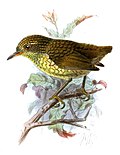Sericulus
| Sericulus | |
|---|---|

| |
| Regent bowerbird (Sericulus chrysocephalus) | |
| Scientific classification | |
| Domain: | Eukaryota |
| Kingdom: | Animalia |
| Phylum: | Chordata |
| Class: | Aves |
| Order: | Passeriformes |
| Family: | Ptilonorhynchidae |
| Genus: | Sericulus Swainson, 1825 |
| Type species | |
| Meliphaga chrysocephalus[1] Lewin, 1808 | |
The genus Sericulus of the family Ptilonorhynchidae consists of four spectacularly colored bowerbirds.[2]
All species build an "avenue-type" bower and are found in New Guinea and Australia.
Species
Accepted species:[3]
| Common name | Scientific name and subspecies | Range | Size and ecology | IUCN status and estimated population |
|---|---|---|---|---|
| Masked bowerbird | Sericulus aureus (Linnaeus, 1758) |
New Guinea | Size: Habitat: Diet: |
LC
|
| Flame bowerbird | Sericulus ardens (D'Albertis & Salvadori, 1879) |
New Guinea
|
Size: Habitat: Diet: |
LC
|
| Fire-maned bowerbird
|
Sericulus bakeri (Chapin, 1929) |
Papua New Guinea. | Size: Habitat: Diet: |
NT
|
| Regent bowerbird | Sericulus chrysocephalus (Lewin, 1808) |
eastern Australia, from central Queensland to New South Wales. | Size: Habitat: Diet: |
LC
|
References
- ^ "Ptilorhynchidae". aviansystematics.org. The Trust for Avian Systematics. Retrieved 2023-07-16.
- ^ International Ornithologists' Union. IOC World Bird List 12.1 (Multilingual Version) (Report). doi:10.14344/ioc.ml.12.1.
- ^ Clements, J. F.; Schulenberg, T. S.; Iliff, M. J.; Billerman, S. M.; Fredericks, T. A.; Gerbracht, J. A.; Lepage, D.; Sullivan, B. L.; Wood, C. L. (2021). The eBird/Clements checklist of Birds of the World: v2021.





